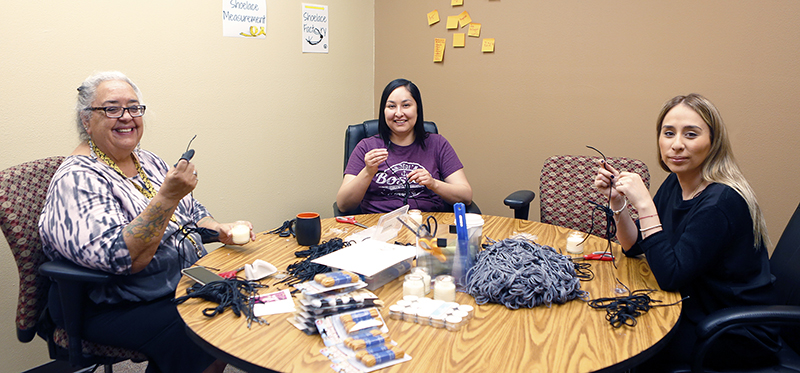Miners Assist Refugees in El Paso
Last Updated on May 24, 2019 at 12:00 AM
Originally published May 24, 2019
By Daniel Perez
UTEP Communications
The thousands of refugees from Central America and Mexico who have crossed into El Paso since late 2018 strained the capabilities of the area's social service agencies. There was a need for community volunteers, and some UTEP employees and students answered that call.

On their own time, these helpers from The University of Texas at El Paso organized, prepared and served meals; helped beautify holding areas; wove shoelaces; arranged medical services; and provided transportation to some migrants to be with their sponsors as they awaited their asylum hearings.
Here are a few of their stories.
Stacey Sowards, Ph.D., chair and professor of the Department of Communication, said she has organized volunteers, to include many UTEP faculty members, who have prepared meals for migrants about twice per month since mid-November 2018. Participants have fixed salads, entrees and desserts and provided fruits, snacks, drinks, as well as cups, plates and utensils.
“I got involved in working with the Annunciation House (one of the leading organizations that has provided hospitality to the migrants) because I believe it is important to help those in need, particularly in a highly charged, politicized environment in our borderlands,” Sowards said. “The migrants coming into our region are people in great need, especially children, parents and others who come from marginalized communities.”
Guillermina Gina Nuñez-Mchiri, Ph.D., director of the Women and Gender Studies Program, and associate professor of anthropology, has helped to organize and serve meals as well as find other team leaders who can do the same.
She said her involvement stems from research she conducted in 2015 about the trauma experienced by Central American women. She said it gave her a deeper understanding of what those displaced people were going through.
“We are facing a humanitarian crisis in our region that is tied to global concerns,” Nuñez-Mchiri said. “This is an opportunity to come together to serve others. This is evidence of how research and practice come together in the name of social justice and a basic moral ethical duty to serve those in need as best we can.”
Yolanda Leyva, Ph.D., associate professor of history and director of UTEP’s institute of Oral History, counts herself among the hundreds who have assisted the refugees.
While she has cooked food, served meals at shelters and given rides to detainees, she is most proud of starting a “shoelace factory” through the Institute of Oral History. Volunteers meet on Wednesdays to make shoelaces for the refugees. Refugees must surrender their shoelaces and belts when they enter the custody of U.S. authorities.
“While we could probably find cheap shoelaces online, the act of sitting down for 30 minutes or an hour to intentionally do something that will help another human being is what is impactful to our students and colleagues,” Leyva said.
She said volunteers made 125 pairs of shoelaces on their first day using supplies donated by Denis O'Hearn, Ph.D., dean of the College of Liberal Arts and professor of sociology.
Jeanett Fernandez, a junior social work major, has worked as an intake volunteer at Annunciation House whenever possible since November 2018, which usually means weeknights and weekends. The bilingual El Paso native said she reviews the migrants’ paperwork and contacts their family members around the country. In some cases, she also drives the refugees to the airport or bus terminal.
“I always have been the grateful type, and when I heard about (the refugees), I felt as if I had to do something to help those in need who just want a better future,” said Fernandez, who lives in San Elizario, Texas, about 20 miles southeast of El Paso. “My parents were immigrants from Mexico. When I was small, I saw how my mother struggled to see her family in Juárez because she was undocumented at the time. We went through a lot. My family knows what it’s like to be separated from family.”
Todd Curry, Ph.D., assistant professor of political science, has helped the refugees in various capacities, but his main contribution has been to organize medical professionals to care for refugees at two sites, and solicit donations of medical supplies and medications. His efforts, along with similar work by physicians at Texas Tech University Health Sciences Center El Paso, morphed into the El Paso Refugee Health Care Provider Coalition. He continues to assist with logistics to include volunteer registration.
“The reasons I got involved and remain involved are a bit different,” Curry said. “I saw images … on Dec. 24 of little girls that reminded me of my daughter, and I couldn’t handle that. I am still involved because the work that Annunciation House is doing is important. Without local nonprofits across the border area, refugees would be released directly to the streets. They are fleeing atrocities, and the least I can do is lend some help.”
Kerry Doyle, director of the Stanlee and Gerald Rubin Center for the Visual Arts, said she organized a group of local artists from El Paso; Las Cruces, New Mexico; and Juárez, Mexico, to paint murals to beautify a drab warehouse used to shelter detainees. These artists painted 10 murals with the help of scores of trained and untrained volunteers. She also got colleagues from the El Paso Museum of Art and the New Mexico State University Art Gallery to provide more than 100 prints and photos to augment the murals.
“I think that people all across El Paso, including UTEP faculty, staff and students, have been moved by the plight of the refugees arriving from Central America,” Doyle said. “We are a welcoming and compassionate community. It was a pleasure to be able to tap our border artistic community, including colleagues from Las Cruces and Juárez, to share what they do best to make Casa del Refugiado (Refugee House) a welcoming place.”